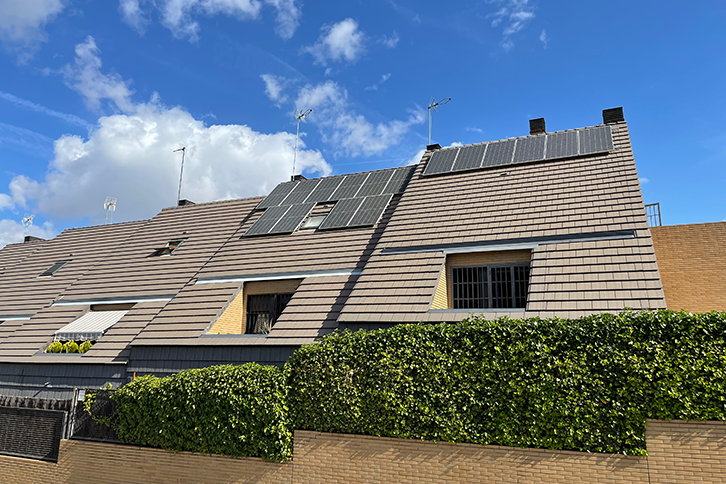News
-
17/10/2022Iberdrola's Hub in Bilbao celebrates its first anniversary with more than 80 collaborating entities in the world centre for smart grids The Global Smart Grids Innovation Hub -GSGIH-, which Iberdrola has in Bilbao, celebrates its first anniversary with more than 80 collaborating companies and entities. One year after its inauguration, the electricity company's Hub has consolidated its position as a global centre for innovation in smart grids, developing solutions for grid digitalisation, integration of renewables, deployment of electric vehicles and energy storage systems. The GSGIH is generating major strategic projects that will guide innovation in distribution networks. The launch of the ASTRA-CC project led by i-DE - with the participation of 20 leading companies, manufacturers, technology centres and universities in electronics and control in the country - involves the evolution of the traditional grid to one that includes direct current grids to optimise the electrification of the economy, integrating renewables, fast charging of electric vehicles and storage. Another example of a strategic Hub project is the TrustGrid, which collaboratively generates innovative cyber security technologies to build long-term solutions and address business challenges. In this way, a new collaborative model will be established to design and develop common "secure by design" technologies that meet the needs of a more cyber-secure smart grid. In addition, work is being carried out on a new phase in the digitalisation of the facilities, the 4.0 substation project based on the development of digital twins (Digital Twin). Based on an intelligent 3D model, generated from drone flights, the various elements of a substation can be sensorised by robots to remotely monitor possible anomalies and provide greater safety for the "connected" workers of the future. The next step is already being tested: drones already allow the installation of bird protection elements on overhead lines, avoiding work at heights. Project activity is complemented by specific Challenges to find new ideas and innovative partners to address specific problems. This year, cameras equipped with artificial intelligence for the early detection of fires are being deployed in the electricity pylons. In the same way, the challenges proposed by the Hub stimulate the development of possible solutions, thanks to the Start-Ups. Iberdrola invested more than €337 million in R&D&I in 2021, 15% more than in 2020. Part of the resources have been directed to projects related to smart grids. It should be noted that, among the achievements of the GSGIH in this first year of operation, is the identification of R&D&I projects underway for a total estimated investment of €32 million in Iberdrola Redes España. The Hub's growth pole This public-private collaboration space -with more than 1,000 m2 and located at Iberdrola's network headquarters in Larraskitu- is a pole of attraction for talent and the promotion of new technologies that will make the energy transition possible, maximising the use of renewables, fully integrating energy storage systems and optimising access to new uses of electricity, such as mobility and air conditioning. Moreover, it is also an international collaborative project, bringing together the potential of more than 200 professionals in the development of innovation projects to be developed in countries in Europe, America and the Middle East. The Global Smart Grids Innovation Hub is connected to the Biscay Startup Bay strategy, as it will also become a scaleup location for startups in the energy sector that set up in the Biscay Tower. READ MORE
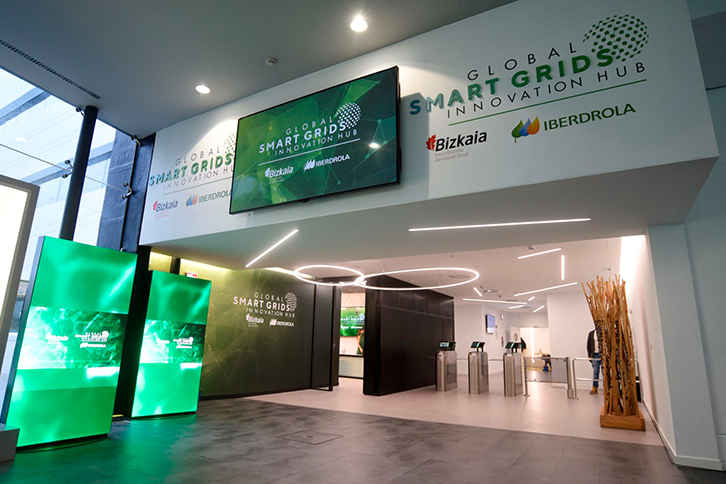
-
15/10/2022Iberdrola starts up the world's first wind-solar hybrid plant in Australia Iberdrola has started the commissioning in Australia of its first wind-solar hybrid project in the world, Port Augusta , after being registered in the National Electricity Market Registry by the Australian Energy Market Operator. This renewable facility, located in the state of South Australia, combines 210 MW of wind power with 107 MW of photovoltaic power and has required an investment of A$500 million. Comprising 50 wind turbines and 250,000 solar panels, the complex is the largest wind-solar hybrid farm in the southern hemisphere. The plant will prevent the emission of 400,000 tonnes of CO2 per year into the atmosphere and will be able to generate enough clean energy to supply the equivalent demand of 180,000 Australian households. The project thus enters the full generation phase with the commissioning of the photovoltaic modules, in addition to the wind power part of the installation, which began the first tests to export energy to the grid last April. The project, which has generated 200 jobs during its construction, has involved local, global and Spanish suppliers. Specifically, the Spanish company Elecnor was responsible for building the plant's substation and transmission line, as well as the storage areas and access roads. Vestas has manufactured and installed the 50 wind turbines of 4.2 MW unit capacity in the wind farm; Longi has supplied the solar panels for the photovoltaic plant and Sterling&Wilson has been in charge of its construction. The commissioning of Port Augusta will make a significant contribution to achieving South Australia's ambitious targets; it hopes to achieve 100% renewable energy by 2030. In addition to facilitating decarbonisation, the plant will help reduce consumer electricity prices and advance energy self-sufficiency. To generate the same amount of power as Port Augusta will produce with a traditional combined cycle would require around 155 million cubic metres of gas per year. Iberdrola, leader in a growing market Iberdrola has made a strong commitment to the Australian energy market. The company plans to make a major investment of up to 3 billion euros in the country, with the aim of reaching 4,000 MW of renewable energy in the coming years. Iberdrola has already committed more than A$1 billion (around €700 million) to new renewable growth projects, such as the Avonlie solar farm in south-western New South Wales and the Flyers Creek wind farm in central New South Wales. The company also acquired the rights to the world's largest wind farm at Mount James, with 1,000 MW, the 360 MW Broadsound photovoltaic power station in Queensland and has invested in a smart solutions business, Autonomous Energy , which offers tailored energy products for commercial and industrial companies. With these investments, Iberdrola has a mature portfolio of more than 2,000 MW in development projects that will facilitate the consolidation of renewable energies as the main vector of the energy transition in the country. The electricity market in Australia is undergoing a profound transformation from a centralised generation system based on large fossil fuel facilities (coal and gas) to a system of distributed generation, primarily wind and solar power. The Iberdrola group was a pioneer in its commitment to a sustainable growth strategy based on promoting the electrification of the economy through investment in renewable energies, electricity grids and energy storage. Thanks to this vision, the company is today a world leader in renewable energies, with close to 39,000 MW of renewable capacity installed worldwide, and is a leader in the energy transition towards a low-emission economy and energy self-sufficiency. READ MORE
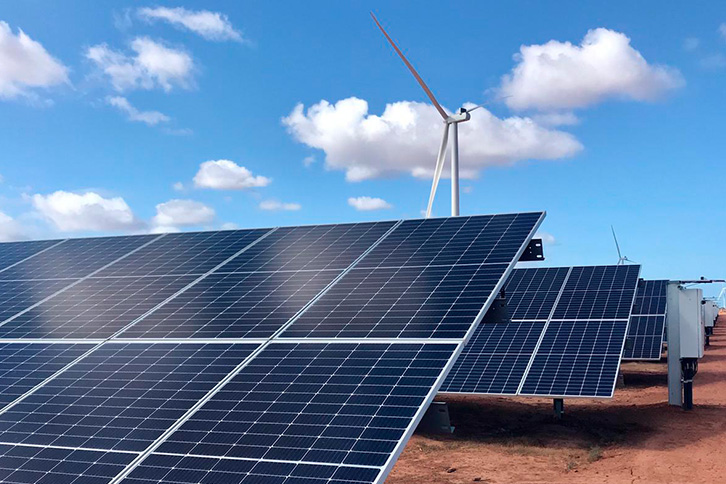
-
14/10/2022Iberdrola's renewable energy production exceeds 55,500 GWh in the first nine months Iberdrola remains committed to renewable energies as the only way to reduce dependence on fossil fuels and promote energy self-sufficiency, which is so necessary at a critical time like the present. Renewable energy production stood at 55,503 GWh in the first nine months, thanks to new installed capacity and the positive performance of onshore wind power, which has compensated for the lack of rain in recent months. In fact, onshore wind production increased by 12% to 33,333 GWh. Iberdrola's renewable production in the period has contributed to avoiding the consumption of some 9.6 billion cubic metres of natural gas, the amount that would have been needed to generate that electricity through this fossil energy source. The company has increased its installed renewable capacity by almost 2,000 MW in the last twelve months, to over 39,000 MW - specifically 39,268 MW 'green' - according to data published today in the National Securities Market Commission (CNMV). With this advance, the company has almost 60,000 MW worldwide. The growth has been thanks to its commitment to Brazil and the United States, mainly. In Brazil, the company has installed 560 MW of 'green' capacity, as it is developing the Otis onshore wind farm complex, which will comprise 12 farms and will have a total installed capacity of 566.5 MW at the end of construction, making it the company's largest onshore wind project in Latin America and the second largest in the world. In addition, it has started commercial operation of its first solar farm complex in the country, Luzia, which has a capacity of 149 megawatts. In the United States, the company has installed 524 MW in the last 12 months: 295 onshore wind and 229 photovoltaic. The utility has set out to lead the energy transition in the world's largest economy with an investment of close to 15 billion euros by 2025. The country already contributes a very significant part of the group's results, with 22.5% of total EBITDA in the first half of the year. By technology, onshore wind in the United States had installed around 8,100 MW at the end of September and solar, 420 MW. In Spain, the company has continued to make progress in the decarbonisation of the Iberian Peninsula with 380 MW of new renewable capacity, mainly photovoltaic -278 MW-. The 'green' installed capacity in the country totals 19,439 MW, mainly onshore wind (6,160 MW), hydroelectric (10,700 MW) and photovoltaic (2,305 MW). Emission reductions In line with its commitment to a long-term environmentally and economically sustainable model, Iberdrola continues with its commitment to reduce its polluting emissions. At the end of the first nine months of 2022, 79% of production was emission-free, bringing installed emission-free capacity to 80%. READ MORE
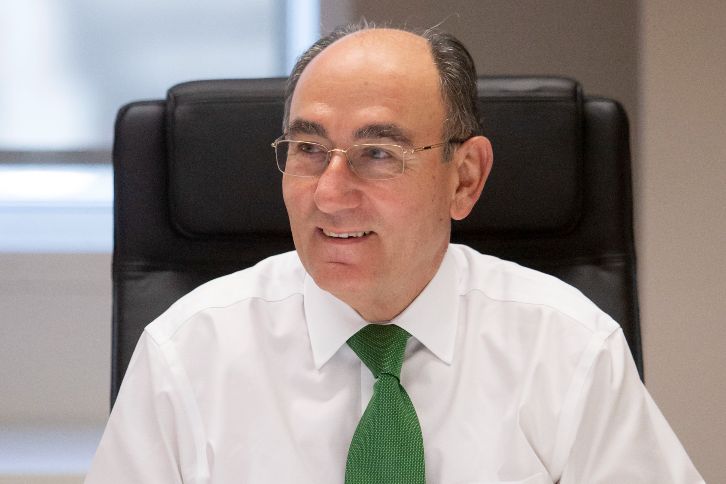
-
13/10/2022Iberdrola seeks solutions to protect its power lines from climate change Distribution lines are one of the pillars of the electricity system worldwide, and even more so with the integration of renewable production, the drive for energy efficiency and the improvement of supply quality. Iberdrola, with 1.1 million transmission lines, aims to reduce faults in distribution networks in forest environments, most of which are due to falling trees and branches caused by weather phenomena caused by climate change. Thus, with the help of its start-up programme, PERSEO, it is seeking solutions that will enable it to make predictions that plan and quantify climate-related risks. Climate change affects all areas, including the electricity sector. And the distribution grid, due to its extension and new environmental threats due to climate change, requires investments to improve its resilience, so that it is prepared to face these threats. In this context, Iberdrola, through its PERSEO start-up programme , is looking for formulas that make it possible to foresee, plan and quantify climate-related risks. It is necessary to determine the risks and threats of interruptions in the distribution network caused by events associated with extreme phenomena or environmental conditions and to be able to evaluate investments that reduce these risks. Among others, wind, vegetation density, soil structure and its long-term evolution due to climate change have to be taken into account. The mission is to minimise damage to network assets caused by falling trees or branches in the vicinity of power distribution lines. The challenge is launched within the framework of BiOK!, the meeting place offered by BEAZ (an entity of the Department of Economic Promotion of the Provincial Council of Bizkaia) for the generation of new business opportunities, in collaboration with Iberdrola's new smart grid innovation centre, the Global Smart Grids Innovation Hub . Iberdrola has transmission and distribution power lines in the United States, Brazil, the United Kingdom, and Spain. This network consists of more than 4,400 high to medium voltage substations and more than 1.5 million medium to low voltage distribution transformers, built and operated to provide a high quality and reliable service to a total of 31 million electricity supply points. The prize will consist of signing a collaboration and testing agreement with PERSEO or any other company in the group, which will assume the costs of these activities and provide the winner with the necessary technical support, as well as a real environment and data to test the solution, giving access to equipment, teams, infrastructures, high-tech sites and joint work areas. The selected project will be developed in collaboration with technical specialists from Iberdrola's Networks area. The engine of start-ups in the energy sector This year, Iberdrola celebrates 15 years of innovation in the energy sector through its start-up programme, PERSEO. This has helped the utility to launch innovative solutions to promote renewable energies, decarbonisation and electrification of the economy, digitalisation of grids, promotion of efficient storage and care for the environment. The initiative, with eight companies currently in its portfolio, has created a global ecosystem of start-ups over the years with an investment of 175 million euros. The programme's ecosystem includes more than 7,500 start-ups, including unicorns - companies valued at more than $1 billion - such as electric vehicle charging solutions manufacturer Wallbox and Stem, which offers smart battery storage solutions. Pilot projects give start-ups access to large volumes of data and real energy assets by testing their technologies in a real environment, while at the same time offering investment to start-ups with the highest growth potential. These two formulas provide insight into the market and access to key technologies first-hand. READ MORE
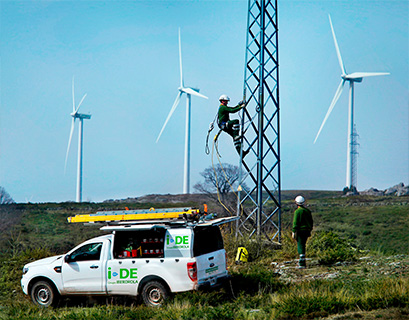
-
12/10/2022Iberdrola and Sempra Infrastructure sign agreement to develop hydrogen and green ammonia projects in the United States Iberdrola and Sempra Infrastructure have signed an agreement for the joint development of hydrogen and green ammonia projects in the United States powered by renewable sources. The agreement provides a framework for companies to identify, evaluate and potentially develop large-scale green hydrogen projects to help meet the energy and decarbonisation needs of US and international customers. The United States faces unprecedented challenges and opportunities to develop competitive solutions to meet its growing energy needs, while aspiring towards a cleaner and more sustainable energy future. With this agreement, Iberdrola, through its subsidiary Avangrid , and Sempra Infrastructure intend to innovate and develop hydrogen and green ammonia projects, which are crucial to decarbonising industry and will help the country achieve its ambitious clean energy goals. Clean hydrogen and ammonia can be effective decarbonisation solutions for various sectors of the US and global markets. Significant infrastructure will be needed to realise the potential of hydrogen and Sempra Infrastructure's platform is well positioned to support the deployment of these new energy solutions. Iberdrola's deep experience in renewable energy development as the third largest renewables operator in the United States complements Sempra Infrastructure's complex project development and commercial expertise in clean energy, power grids, LNG and net-zero solutions. Sempra Infrastructure is currently developing multiple world-class energy transition projects in North America, as well as new opportunities in renewable energy and carbon capture and other ways to produce clean hydrogen and ammonia from available resources in different regions. The agreement is non-binding and the development of these joint projects is subject to a number of risks, including reaching definitive agreements, obtaining all necessary permits and making a final investment decision with respect to each project. A success story in the United States Iberdrola's presence in the United States is a success. In less than two decades, the company has become one of the largest groups in the North American electricity sector, listed on the US stock exchange since 2015. The subsidiary, which aims to be a leader in sustainable energy in the United States, is present in 24 states, has more than 8,500 MW of renewable energy installed (mainly wind and photovoltaic) and more than 170,000 kilometres of power lines through eight distributors in New York, Connecticut, Maine and Massachusetts. In addition, the Spanish company has a portfolio of high-quality renewable projects in the United States of more than 25,000 MW, which represent a stable platform for continued growth over the next few years as the country meets its decarbonisation targets. The company currently employs more than 7,350 people directly and contributes indirectly to the creation of some 70,000 jobs, with a contribution of more than 10 billion euros to the country's GDP. Just a few weeks ago, Iberdrola announced that it will accelerate its growth in the United States with investments amounting to 15 billion euros over the period 2022-2025, mainly focused on the network business. Green hydrogen, a reality for Iberdrola As it did with renewables 20 years ago, the company has once again pioneered the new technological challenge of producing and supplying green hydrogen. Green hydrogen is one of the most efficient solutions to help the most polluting industrial sectors, where electrification is not possible, to transform their processes and become more sustainable. In its commitment to leading the energy transition, Iberdrola is spearheading the development of green hydrogen, supporting the hard-to-electrify industry to reduce its polluting emissions. Among the projects promoted by the company, of note is the installation in Puertollano (Ciudad Real) of the largest green hydrogen plant for industrial use in Europe, capable of producing 3,000 tonnes of emission-free H2 per year, thanks to the use of renewable sources. READ MORE

-
11/10/2022Iberdrola launches an information campaign for customers to reduce consumption and save on bills Iberdrola has launched a campaign to help its customers reduce their energy consumption while maintaining comfort in their homes. With this initiative, the company seeks to raise awareness in society that the best energy for customers and for the planet is that which is not consumed, especially in the current context generated by high gas prices. Through this campaign, the company expects to send a total of 90 million communications with personalised savings advice to its more than 11 million electricity and gas customers in Spain during the autumn and winter months, when energy consumption is higher due to lower temperatures. Iberdrola has already disseminated six million communications and has found that customers who have received these notifications have reduced their consumption by around 5% compared to the same period last year. The company is able to make customised recommendations thanks to an intelligent algorithm that estimates the energy expenditure of household appliances, heating and lighting and compares it with that of other households with similar characteristics, which enables inefficient usage habits to be detected. Customers then receive individualised information on the cost to their bill, the deviation from the average and an estimate of the savings that can be obtained by following Iberdrola's efficiency advice. Most of the communications will be sent via Iberdrola's free App, as 60% of its customers are digital. However, the company will also disseminate these tips by email and on the paper bill to ensure that they are received by everyone, especially older people. Iberdrola has also created a specific website with 50 practical tips to reduce consumption and will disseminate them throughout society with messages in the media, which, in digital and print media, are accompanied by a QR code with direct access to this website. The group has launched similar campaigns in other countries where it has commercial activity, such as the United Kingdom and Portugal. Savings through energy efficiency This initiative to help households save on their bills through energy efficiency is in addition to the campaign recently launched by the company to promote photovoltaic self-consumption through Smart Solar . The installation of a self-consumption solar system can save families up to 70% on their annual energy bills. This saving is produced in three ways: the energy produced by the installation that the user does not have to buy, compensation for surplus energy not consumed, which is fed into the grid, and savings due to lower taxes. In addition, this campaign incorporates the novelty that in the event that there are still surpluses after offsetting 100% of the bill with the energy fed into the grid, Iberdrola's self-consumers will be able to divert them for consumption in another residence. Iberdrola has made self-consumption available to any customer, whether or not they have their own roof. In Spain, more than two thirds of the population live in high-rise buildings. To cover this segment, in 2019 the company launched its Solar Communities , through which several users can share their own 100% renewable energy from the same photovoltaic installation. The development of smart solutions is one of the strategic lines of the Iberdrola group, which expects to reach 40 million contracts with customers worldwide by 2025 with services such as energy storage, heat pumps and electric mobility, in addition to self-consumption. READ MORE

-
09/10/2022More than 7,000 people join the International Volunteer Week with Iberdrola Iberdrola's volunteers have thrown themselves into the more than 90 initiatives that have been developed throughout this week in the different countries where the company is based. More than 7,000 volunteers wanted to participate, 40% more than last year, from Spain to the United States, Mexico, Brazil, the United Kingdom, Portugal, Greece, Italy, Germany, France, Belgium, Japan and Australia. Under the slogan 'Together we build the world we want', from 1 to 9 October, solidarity projects related to environmental care, the inclusion of vulnerable groups and social assistance were carried out. For example, in Spain, last Thursday native species were planted in the municipality of Solosancho in the province of Avila. There, more than 100 Iberdrola volunteers, together with 60 members of the AMAS Foundation and the Ande Foundation, collaborated in the planting of 800 native trees in one of the municipalities affected by the Navalacruz fire in 2021, which devastated nearly 22,000 hectares. The Chairman of Iberdrola himself, Ignacio Galán, travelled there to share the reforestation day with them. Basically, Quercus Ilex and Juniperus Thurifera species were planted, and a game fence was installed to ensure the protection of the planted trees from livestock. In addition to environmental days such as the one in Ávila, Iberdrola has carried out other solidarity activities such as a global race to donate food packs to vulnerable families, clean-ups of invasive species and waste on beaches, riverbanks and forests, cleaning of seabeds, and the construction and adaptation of different spaces in social entities such as gardens, cultivation tables and vegetable gardens. In addition, shelters have been built to protect species at risk, toys have been created to improve the cognitive development and psychomotor skills of people with disabilities and the elderly, and environmental awareness, sports and inclusive leisure workshops have been held with different vulnerable groups. Volunteers have provided training in energy efficiency , the fight against climate change , responsible consumption, recycling, as well as workshops to improve the employability of women at risk of severe social exclusion, promote reading among children from vulnerable environments and facilitate the social and employment integration of refugees. Donations of children's books, school kits and clothing and hygiene products for the homeless have also been made, as well as contributing to UNICEF to improve universal immunisation coverage for children around the world. Face-to-face and online actions The week was carried out in a hybrid format in which it was possible to participate both in person and remotely, in order to amplify and facilitate opportunities for participation. Iberdrola volunteers and their families shared these activities with other groups, such as people with disabilities, young people and women in vulnerable situations, refugees, children and the elderly. The Iberdrola Volunteer Programme was established in 2006. It is a global, international project aligned with the values of the group, with its Sustainability Policy and with the Sustainable Development Goals (SDGs). Specifically, it focuses on Goals 3 (health and well-being), 4 (quality education), 5 (gender equality), 7 (affordable and clean energy), 10 (reduction of inequalities) and 13 (climate action). Iberdrola's Corporate Volunteering Programme has been recognised by the United Nations by being included in the report 'Transforming Lives and Communities', published by IMPACT2030 in collaboration with the United Nations Office for Partnerships. This report recognises it as a pioneering practice in harnessing the skills, passion and experience of its employees to achieve the Sustainable Development Goals (SDGs). Iberdrola is the only Spanish company in the energy sector among the 19 companies selected in the report published on the occasion of SDGs Week 2021. More than 700 activities per year Through the Programme, more than 700 activities are offered annually and more than 12,000 volunteers participate. It is a diverse programme that adapts to the social needs of a changing environment and offers opportunities for all employees to contribute to social and environmental improvement. The initiatives are developed both in Spain and abroad and are related to the inclusion and development of groups at risk of social exclusion. Similarly, programmes are also offered to promote care for the environment and the protection of biodiversity, access to energy for those who do not yet have it and response to emergencies and humanitarian crises. READ MORE
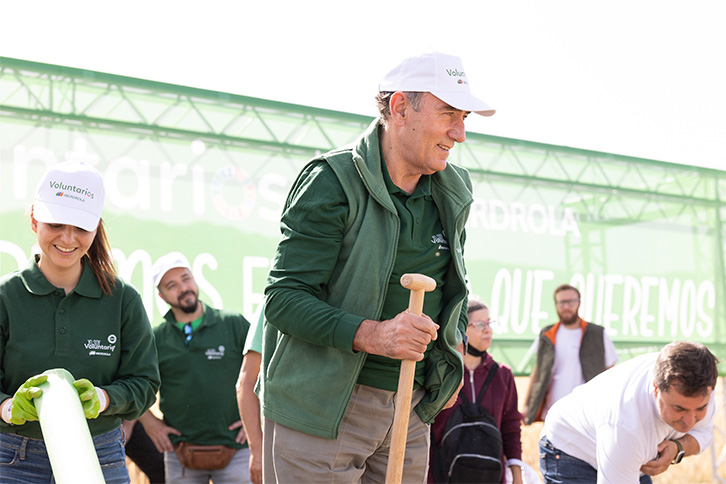
-
05/10/2022More than 70,000 installations already enjoy self-consumption thanks to Iberdrola's network Iberdrola has now exceeded 70,000 self-consumption installations connected to its grid after beating its record number of additions in a single month in August, with more than 6,100 new self-consumers contributing a total of 63 new MW of green generation fully integrated into the low and medium voltage grids. Altogether, the self-consumption installations connected to the grid of i-DE, Iberdrola's distribution company in Spain, have a capacity of more than 900 MW, the equivalent of the capacity of two large combined cycle generation plants which, thanks to self-consumption, can be replaced by sustainable and indigenous sources. The company facilitates access to self-consumption throughout Spain. By number of connections, the Valencian Community stands out with more than 28,000 installations on the grid. It is followed by Madrid and the Region of Murcia, with more than 20,000 and almost 9,000 connected installations, respectively. i-DE has processed the applications for self-consumption connection in record time, even improving on the demanding deadlines established by current legislation, which is a sign of the company's firm commitment to the energy transition towards more sustainable generation sources. To facilitate the processing of accesses, the company has developed an interactive geographical capacity map , available to any user through the i-DE website (www.i-de.es). This map makes it possible to consult the capacity of the network operated by the company and to identify the location of the connection points. A new form of storage 98% of Iberdrola's self-consumers choose to return the surplus to the grid during the day once their energy demands have been met through the different discharge methods (individual or collective), which allows them to get the most out of their investment. In this way, i-DE's grids act as a large energy storage battery for its customers as they can access the surplus generated when they need it, at no additional cost. The grids managed by Iberdrola have been able to respond to the strong rate of increase in self-consumption without saturation or overloads and maintaining high levels of supply quality thanks to the heavy investments made in recent years. The company plans to allocate €2.6 billion until 2024 to the digitalisation and innovation of its grids in Spain. This effort has allowed i-DE to carry out new developments in order to measure in real time both the consumption and the load level of all its installations. Through the use of Artificial Intelligence, the company is able to process this information to anticipate the grids that will need reinforcements in the event of higher load levels due to the implementation of new self-consumption installations. Thanks to this planning, i-De can guarantee the maintenance of the electricity supply without alterations to all homes and industries. i-DE manages and maintains 270,000 kilometres of electric power distribution lines that extend across ten autonomous communities and 25 provinces, covering an area of 200,340 square kilometres. It also has more than 97,000 transformation centres and more than 1,100 substations to serve its more than eleven million customers. Leader in self-consumption marketing As part of its commitment to accelerating the energy transition, Iberdrola not only promotes self-consumption by encouraging its incorporation into the energy system through its grids, but also leads the market, managing 40% of the country's self-consumption customers. So far this year, the company has increased its portfolio of self-consumption customers by 150%. Iberdrola, a pioneer in offering self-consumption for customers with single-family homes, has adapted to different needs to make solar self-consumption available to all its customers through its new Smart Solar solutions. Currently, more than two-thirds of the population in Spain lives in high-rise buildings. For this segment, the energy company offers collective self-consumption alternatives that include the possibility of ceding the roof space to Iberdrola so that it can take on the installation of the photovoltaic system, facilitating access to the green energy generated for people living nearby. As for the possibility of compensating the energy dumped into the grid, Iberdrola's customers do not have any type of floor for its valuation, so that their bill can be as low as zero euros. In addition, it has just launched the Solar Cloud service, which, in the event that there are still surpluses, allows them to be diverted for consumption in another residence. READ MORE
